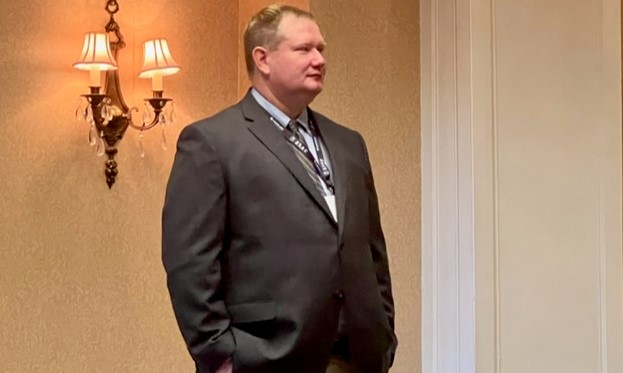Fri, 28 Oct 2022 11:59:43 CDT


At the American Society of Agricultural Consultants Annual Conference, Farm Director, KC Sheperd, got the chance to visit with the Senior Staff Attorney at the National Agricultural Law Center, Rusty Rumley, about energy leases and foreign ownership of agricultural land in the United States.
“Some of the hot topics that we are working on right now are the 2023 Farm Bill- we are looking at development there,” Rumley said. “We have had a lot of interest in environmental laws such as Waters of The United States. We are seeing movement for foreign ownership of ag land, and increasingly, we are seeing a lot of interest in solar developments.”
There has been quite a bit of development in Oklahoma, Rumley said, especially on the wind side in the last decade.
“We probably are going to be seeing a lot more solar going forward,” Rumley said, “With the Inflation Reduction Act that was signed into law back in August of this year, there is a lot of money out there for renewable energy.”
Over the next ten years, Rumley said he expects to see much further development of renewable energy, particularly solar.
“For the landowners, if you are careful in signing the contract and you put a lot of forethought, and you use a good attorney to make sure that you are signing a good deal, these can be pretty lucrative for the landowner,” Rumley said.
Rental rates for energy leases can range from 400 to 1600 dollars an acre, Rumley said, so over the course of many years a landowner can see a significant cash flow come in.
“These are long-term leases, so it is going to be really important that you look at all the potential ramifications before you sign it,” Rumley said.
With the average ag of the American farmer being around 58 years old, Rumley said in many cases, it will be the kids or grandkids that will be dealing with the lease in the future.
“It is really important that you think this through not just for your own sake but for your kids and grandkids sake as well,” Rumley said.
One important part of the lease to pay special attention to before signing, Rumley said, is who is paying for decommissioning the project at the end of the lease.
“A lot of the ones I have seen don’t have that kind of language in there, but there is nothing stopping the landowner from reaching out to the company and saying, ‘hey, there is nothing in here about cleanup- let’s figure something out on this type of language.'"
Rumley also talked about the increase in foreign ownership of agricultural land.
Long-term leases, Rumley said, fall under the umbrella of foreign-owned land, so many wind projects that have investors from the Netherlands or Italy are classified as foreign owned land.
“Those long-term energy leases are also considered foreign-owned land under the AFIDA (Agricultural Foreign Investment Disclosure Act) Statute, so we really don’t know how much of it truly is foreign-owned,” Rumley said.
Land may be owned and farmed by American farmers, Rumley said, but if there are a few wind turbines or solar panels on that property owned by foreigners, the land is classified as foreign-owned land.
There are many misconceptions, Rumley said, about who owns a majority of the foreign-owned land.
“A lot of the land here in the United States is owned by the Canadians,” Rumley said. “Specifically, forest land.”
With the modern economy we have, Rumley said it is hard to determine who owns what.
“Land is sometimes owned by individuals, but a lot of times it is owned by companies such as LLCs or corporations,” Rumley said. “Who is going to be shareholders of those corporations? Are there subsidiaries of those corporations? You know, you have a bank that takes a farm in foreclosure. Well, if some of the shareholders of that bank are foreign entities, now you have foreign-owned land because you have got foreign investors of the bank that hold it.”
Click the LISTEN BAR below to hear KC Sheperd and Rusty Rumley talking about the latest issues in ag law.
click to play audio or right-click to download
















